Overview
The article highlights the emotional challenges faced by healthcare providers in today's fast-paced environment. Medical apps emerge as a beacon of hope, designed to enhance health-related functions. These specialized software solutions offer invaluable features like telehealth services, medication management, and health monitoring, all aimed at improving patient care and outcomes.
As technology advances and user adoption rises, the evolution of these apps becomes increasingly vital. They not only optimize healthcare delivery but also address pressing challenges such as access disparities and data privacy concerns. By embracing these innovations, we can support healthcare providers in overcoming administrative burdens that often detract from patient care.
Imagine a world where healthcare is more accessible and efficient. The benefits of these apps are profound, enabling providers to focus on what truly matters: their patients. We encourage you to explore how these tools can transform your practice and enhance the care you deliver.
Let’s work together to navigate this evolving landscape. By understanding the potential of medical apps, we can foster a supportive environment that prioritizes patient well-being and addresses the unique challenges in healthcare today.
Introduction
In an era where technology intersects with healthcare, the emergence of medical applications is transforming how individuals manage their health. These specialized tools not only foster communication between patients and providers but also significantly enhance the overall quality of care. With features like telehealth and medication management, they offer solutions that resonate with the needs of both patients and healthcare professionals.
However, as our reliance on these applications deepens, we must also confront the challenges of accessibility, privacy, and effectiveness. These concerns can weigh heavily on healthcare providers, who strive to offer the best care possible amidst administrative burdens. What does the future hold for medical apps? How can we harness their potential to improve patient outcomes while navigating these complexities?
By reflecting on these questions, we can begin to envision a path forward that prioritizes both innovation and compassion in healthcare. Together, we can explore ways to leverage technology in a manner that respects patient privacy and maximizes accessibility, ensuring that every individual receives the care they deserve.
Defining Medical Apps: A Comprehensive Overview
In the fast-paced world of healthcare, providers often encounter emotional challenges that can impact patient care. An app in medical terms, also known as a health tool, is a specialized software program designed for mobile devices like smartphones and tablets. These tools aim to enhance various health-related functions, allowing users to manage their health more efficiently and access vital information.
Imagine being able to communicate seamlessly with healthcare providers while tracking your fitness and medication adherence. These applications offer a diverse array of functionalities, including telehealth services and diagnostic support. Understanding healthcare applications, referred to as app in medical terms, is essential, as they differ significantly from general wellness apps by serving specific roles in clinical environments and individual care.
Platforms like CosmaNeura take these functionalities a step further. They provide features such as for telehealth sessions, improving documentation accuracy and ultimately enhancing patient care. Furthermore, the integration of AI-driven billing recommendations within CosmaNeura's medical applications streamlines billing processes and reveals past revenue opportunities, addressing the financial challenges many medical providers face.
Recent data indicates that approximately 43% of the U.S. population utilized health applications in 2024, showcasing a growing trend among providers to adopt these tools. Additionally, the health app sector generated $3.74 billion in revenue that same year, reflecting significant advancements in technology that support individual care.
As healthcare continues to evolve, the effective incorporation of an app in medical terms in clinical settings becomes increasingly vital. These tools provide innovative solutions that can improve health outcomes and optimize healthcare delivery. CosmaNeura's dedication to adhering to Catholic teachings ensures that these technological advancements align with ethical guidelines, reinforcing the moral responsibility of patient care.
How can you leverage these advancements to enhance your practice? Embracing health applications may not only alleviate administrative burdens but also foster a more compassionate approach to patient care.
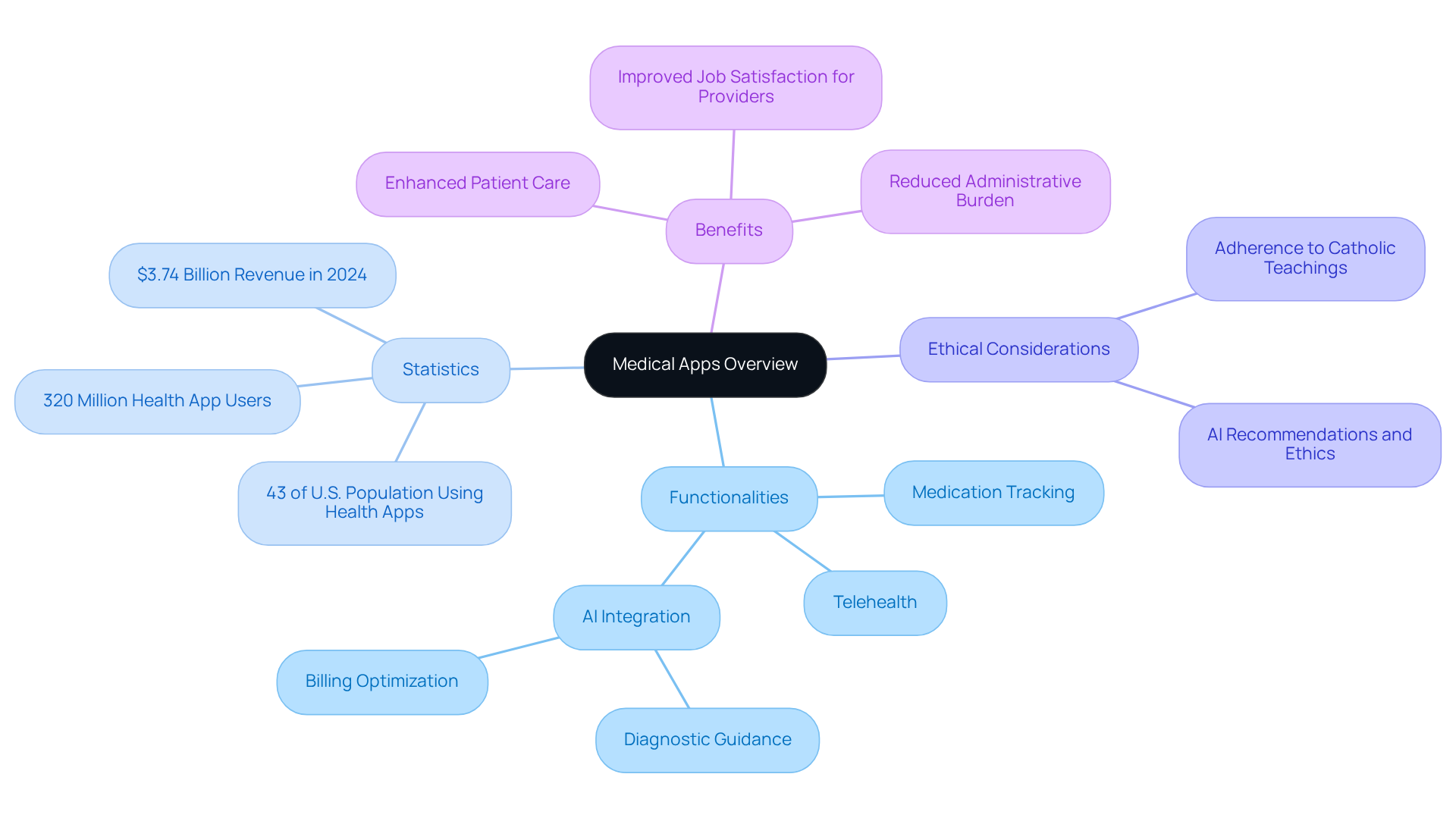
The Evolution of Medical Apps: From Concept to Essential Tool
The journey of healthcare applications began in the early 2000s, a time when mobile technology started to emerge. Initially, these applications were quite basic, primarily focusing on fitness monitoring and essential health information. As smartphones became ubiquitous and technology advanced, healthcare applications transformed, integrating more sophisticated features such as telemedicine, electronic health records (EHR) integration, and real-time health monitoring.
Have you noticed how telemedicine usage has surged in recent years? Recent statistics reveal a significant rise, with telehealth claims jumping from just 0.1% in 2019 to about 5% by the end of 2021. Even more striking is the remarkable 766% increase in encounters during the early months of the COVID-19 pandemic. This clearly demonstrates our growing reliance on these vital tools.
Today, the app in medical terms is indispensable for wellness, offering resources for patient engagement, chronic illness management, and clinical decision support. This evolution greatly enhances the overall quality of care. For instance, CosmaNeura's Agentic Platform showcases how innovative AI solutions can tackle existing challenges in medical delivery, addressing critical issues like limited access and physician burnout.
Yet, we must acknowledge that challenges persist, particularly concerning to telemedicine services. The essential role of smartphone technology in shaping the future of medical service delivery is undeniable. As it continues to drive innovation and accessibility in medical applications, we are reminded of the importance of addressing these emotional and practical challenges together.
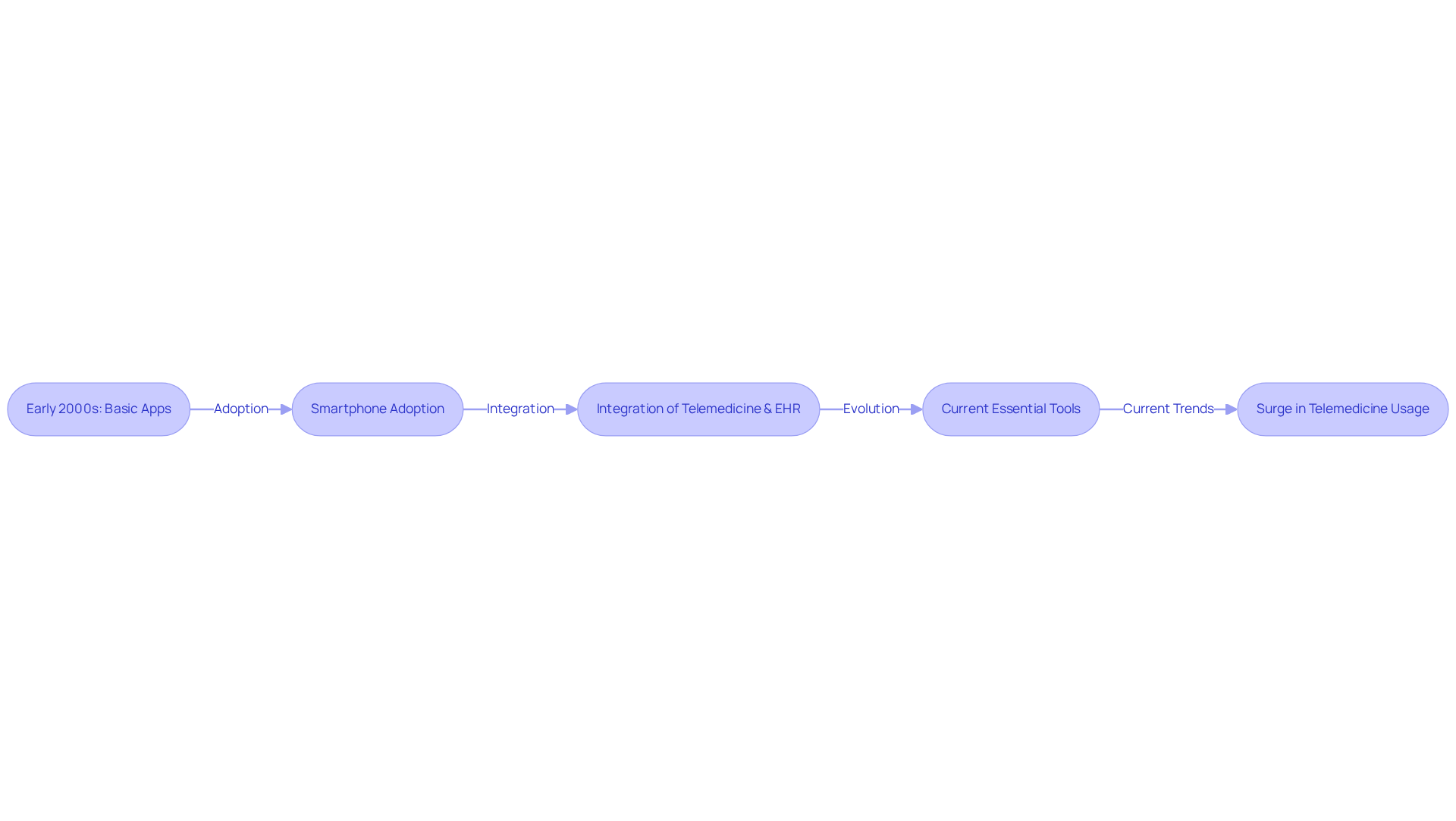
Key Features and Functions of Medical Apps in Healthcare
The app in medical terms is designed with a variety of features that enhance medical service delivery and improve client outcomes, especially in underserved communities. These tools can make a significant difference in how care is accessed and experienced.
- Telehealth Services: Imagine being able to consult with your healthcare provider from the comfort of your home. This is now a reality for many, with 76% of individuals wanting to continue using telehealth services post-Covid-19. The convenience and effectiveness of these remote consultations are clear, as 55% of users report being 'much more satisfied' with telehealth compared to traditional face-to-face visits. This is particularly vital for underserved groups facing barriers to conventional medical services.
- Medication Management: Keeping track of medications can be overwhelming, but these applications simplify that process. Users can set reminders and receive alerts for refills, which is crucial for adherence. Studies show that the use of an app in medical terms leads to improved medication adherence rates, ultimately resulting in better health outcomes. By easing medication management, these tools help alleviate some of the burdens on healthcare providers.
- Health Monitoring: Continuous health monitoring is essential for timely interventions. These applications allow users to track vital signs, symptoms, and other health metrics, often syncing with wearable devices. This ongoing observation is especially important in faith-based medical practices that prioritize comprehensive engagement with individuals.
- Consumer Education: Knowledge is power, and medical applications provide access to educational materials and tailored health information. This empowers individuals to take control of their health, promoting informed decision-making and engagement, particularly in communities with limited access to information.
- Clinical Decision Support: Medical practitioners benefit from tools that support informed clinical choices based on individual data and evidence-based guidelines. This assistance is crucial for enhancing care quality and ensuring adherence to best practices, ultimately reducing the administrative burden on providers.
Together, these features not only streamline medical processes but also make the app in medical terms more effective, leading to better outcomes for individuals and greater satisfaction with care. Notably, 52.5% of medical professionals believe teleconsultations are more effective for treatment and follow-up appointments, underscoring the value of telehealth services. Yet, challenges persist in making the benefits of telemedicine accessible to all demographics. How can we work together to overcome these barriers? Your engagement and feedback are vital in .
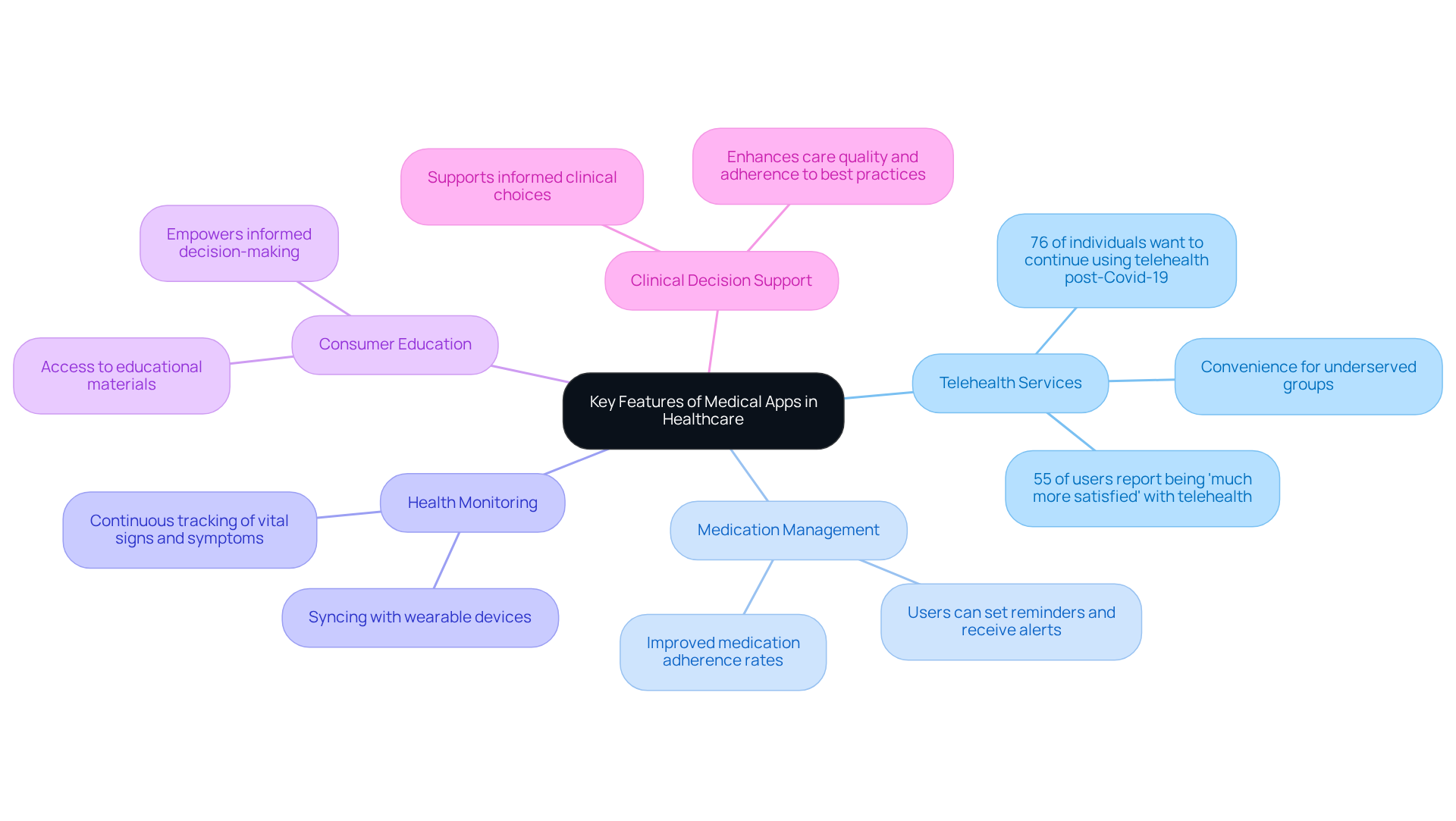
Impacts of Medical Apps: Benefits and Challenges in Healthcare
The influence of the app in medical terms on health services is profound, offering significant benefits such as increased patient involvement, improved access to treatment, and better health outcomes. Have you ever considered how technology can empower individuals in their health journeys? Research shows that those using an app in medical terms are more likely to adhere to treatment plans. In fact, studies reveal that 39% of randomized controlled trials (RCTs) measuring effects on disease-specific clinical outcomes reported notable improvements among users.
Yet, we must acknowledge the challenges that persist. Concerns about data privacy, the need for regulatory oversight, and the risk of over-reliance on technology for self-diagnosis can weigh heavily on our minds. Additionally, disparities in access to technology exacerbate inequities in medical service delivery. Did you know that approximately 37% to 39% of individuals with chronic conditions lack access to smartphones or have devices that do not support iOS or Android operating systems? Addressing these obstacles is essential to fully harness the benefits of healthcare applications while ensuring safety and confidentiality.
For example, an app in medical terms, specifically mobile health technologies, has proven effective in managing chronic diseases, with 56% of RCTs showing significant improvements in adherence behaviors. As the health sector continues to evolve, it becomes increasingly important to navigate these complexities to enhance the overall effectiveness of health applications in supporting individuals. Together, we can strive for a future where , fostering a healthier community for all.
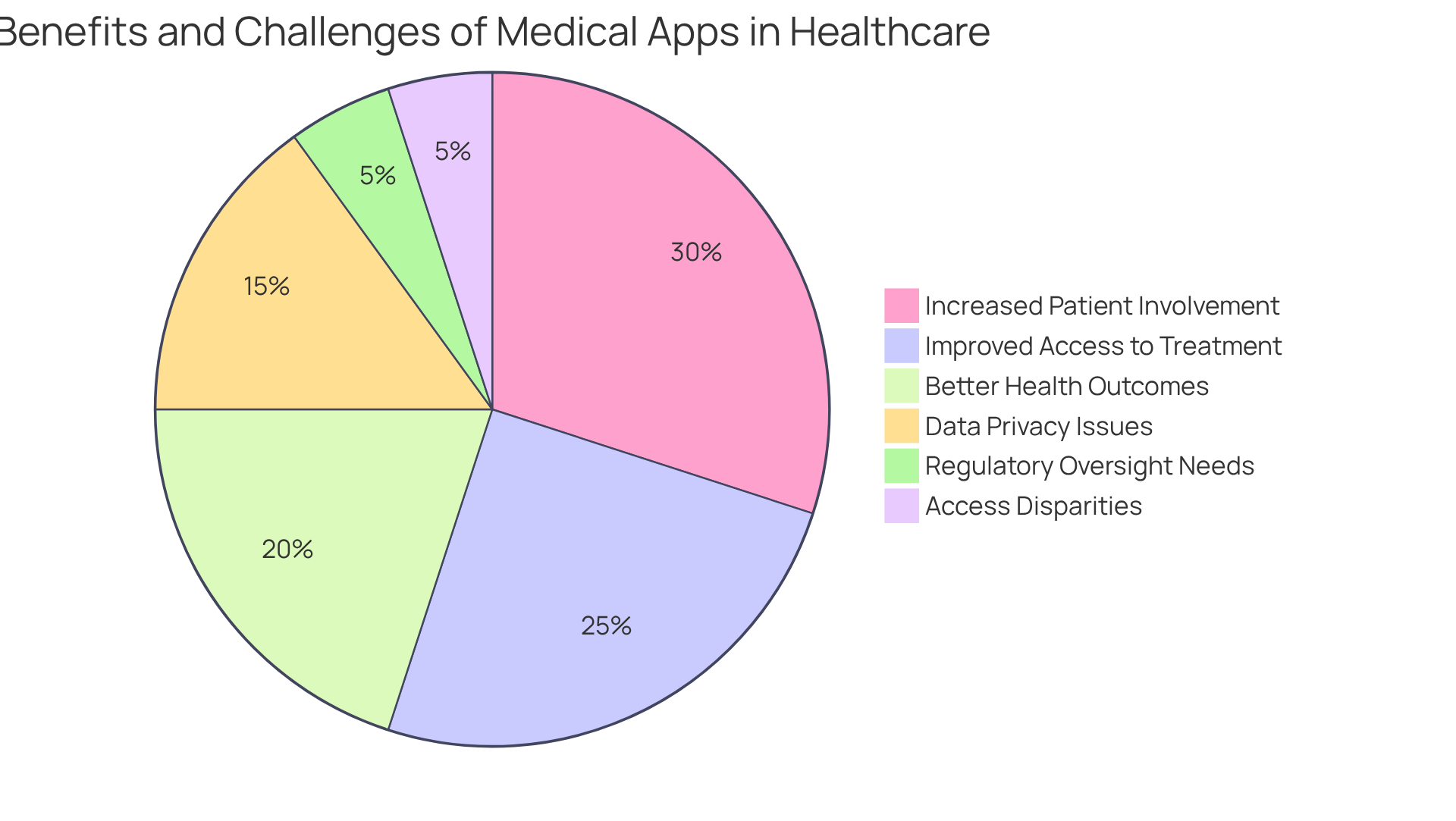
Future Trends in Medical Apps: Innovations and Expectations
The future of the app in medical terms is poised for remarkable advancements, driven by innovations in artificial intelligence (AI), machine learning, and data analytics. These technologies promise to enhance the customization of medical services through an app in medical terms, offering personalized suggestions based on individual user information. Imagine AI-driven algorithms analyzing vast datasets to identify patterns and recommend tailored treatment plans—this could significantly improve outcomes and patient satisfaction.
Moreover, the integration of augmented reality (AR) and virtual reality (VR) into clinical applications, often referred to as app in medical terms, is set to revolutionize patient education and provider training. By creating immersive learning environments, these technologies can enhance understanding and retention of complex healthcare information, ultimately leading to improved clinical practices. In fact, 82% of health professionals agree that VR is an effective tool for education, highlighting its value in training.
As regulatory frameworks evolve, there will be a heightened focus on ensuring the security and effectiveness of the app in medical terms. This shift is crucial for fostering trust among users, as both medical providers and individuals seek reassurance that the technologies they rely on are safe and effective. With the projected to reach nearly $2 trillion by 2030, and the extended reality (XR) market size anticipated to hit USD 472.39 billion by 2029, the potential for applications to enhance health delivery is immense.
In summary, the future of medical applications holds great promise. With AI innovations and immersive technologies working together, we aim to enhance patient care and streamline healthcare processes. How can we further engage with these advancements to ensure they meet our needs? Let's explore this journey together.
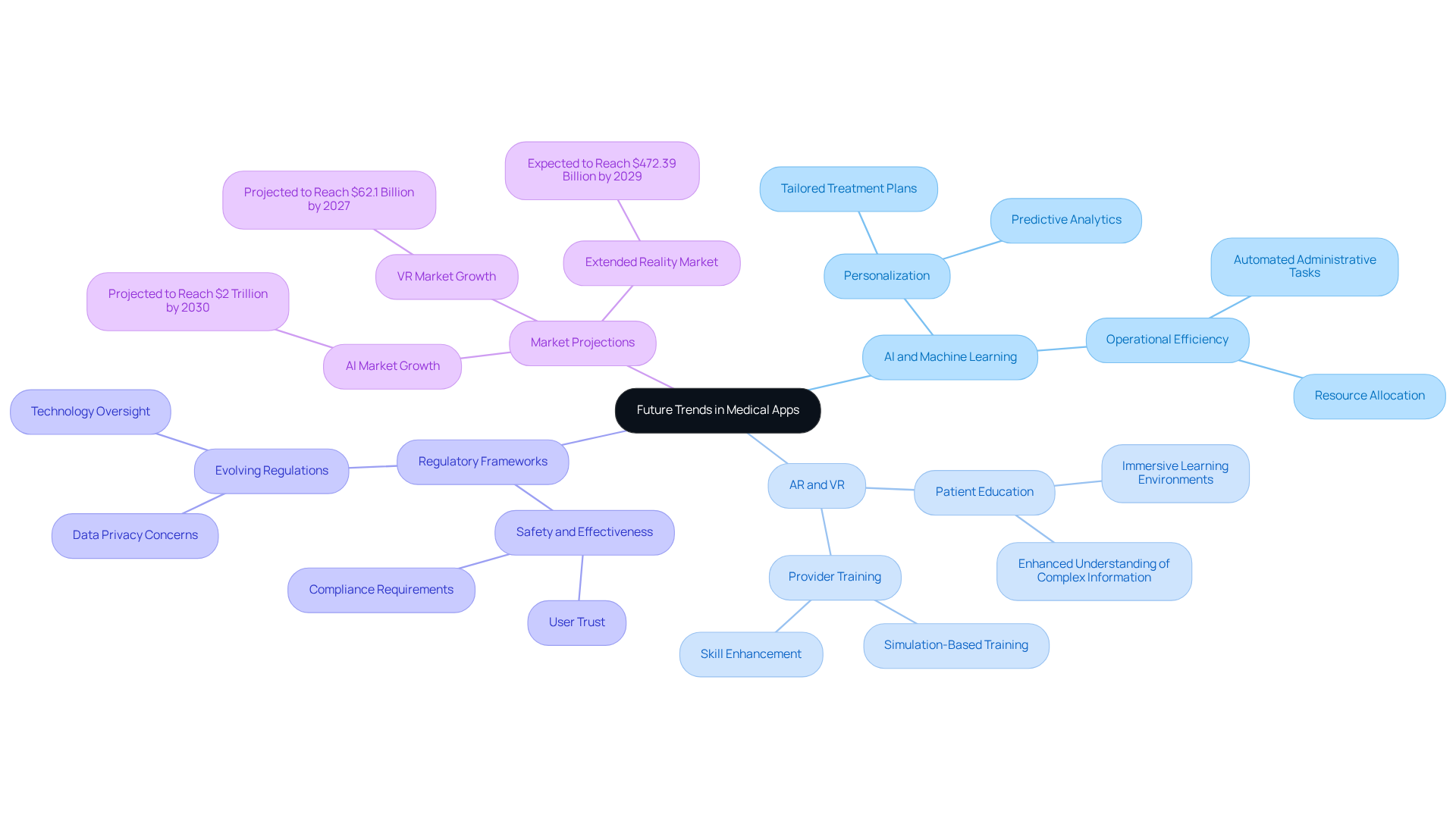
Conclusion
The exploration of medical apps highlights their vital role in modern healthcare, transforming the interactions between patients and providers while managing health information. These applications, specifically designed for medical purposes, enhance patient engagement, streamline communication, and facilitate better health outcomes. They are indeed indispensable tools in clinical practice.
Have you considered how these advancements can alleviate some of the emotional burdens faced by healthcare providers? Medical apps have evolved from basic tools to sophisticated platforms that support telehealth, medication management, and real-time health monitoring. The integration of advanced technologies like AI and machine learning further personalizes healthcare, but we must also acknowledge the ongoing challenges of access and data privacy that complicate their adoption.
Ultimately, the importance of embracing medical applications cannot be overstated. As healthcare technology continues to advance, it is crucial to advocate for inclusive access and address disparities. This ensures that all individuals can benefit from these innovations. Engaging with these advancements not only enhances patient care but also fosters a more compassionate and efficient healthcare system, paving the way for a healthier future for all.
Key Solutions:
- Advocate for inclusive access to medical apps.
- Address disparities to ensure equitable benefits.
- Continue to engage with technological advancements.
By taking these steps, we can create a healthcare environment that is not only effective but also deeply compassionate, ensuring that every individual receives the care they deserve.




